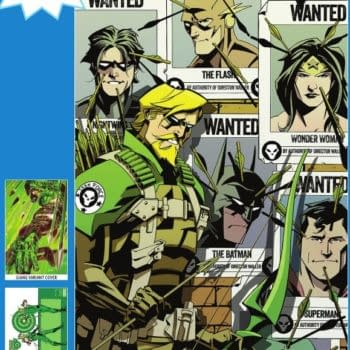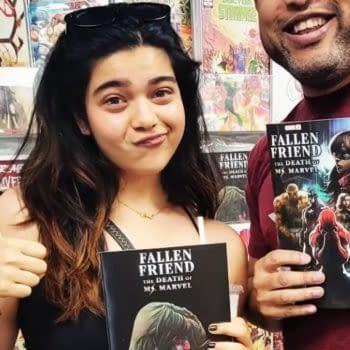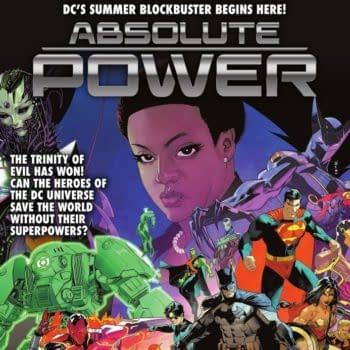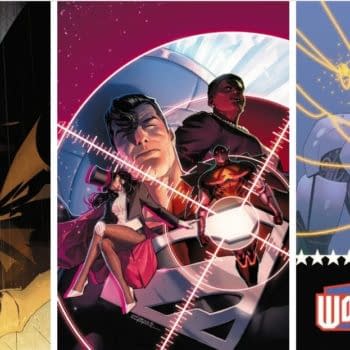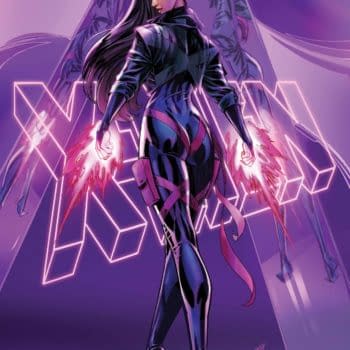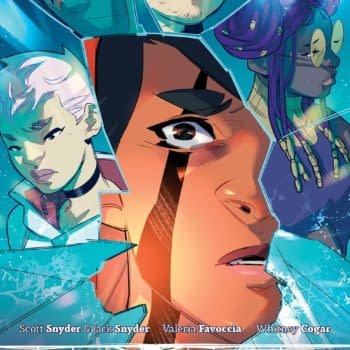Posted in: Comics, san diego comic con | Tagged: 2016, comic con, comiccon, comicon, Comics, entertainment, july, san diego, san diego comic con, sdcc, sdcc '16, sdcc16, sdcc2016
Know A Member Of The Wu-Tang Clan And Other Ways To Break In To Marvel At San Diego Comic-Con
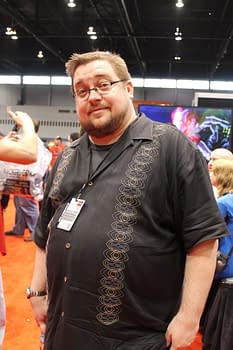
Hugh Sheridan writes
Room 25ABC hosted the "Breaking Into Comics the Marvel Way" SDCC panel on Thursday afternoon.
In attendance were Marvel's Rickey Purdin, C.B Cebulski and Chris D'Lando as well as writers Jim Zub, Robbie Thompson and Matthew Rosenberg.
Purdin moderated the panel and started off asking everyone about how they personally got in to the industry.
Chris D'Lando was working in sales and marketing and always wanted to work at the company so he went to conventions and was active on the internet contacting creators and editors so that when a position opened up in Marvel's marketing team he was one of the people they thought to go to.
Matthew Rosenberg (Civil War II: Kingpin) was always a big comics fan, but he came from a family of writers so initially he did not want to write. He was working in the music industry and a friend who knew he was into comics put him in touch with RZA and Ghostface Killah of the Wu-tang clan who was looking to do a comic and he eventually put out a book called "12 Reasons To Die" with him which led to Indy comics work which led to Marvel. So basically he said "if you want get in to the industry just get to know any member of the Wu-Tang Clan"
Robbie Thompson's brother taught him to read through comics. He always wanted to be a comics writer and, he says, only became a TV writer – working on the WB show Supernatural – as a means to achieve that and it worked – he now works on Spectacular Spider-Gwen and is writing an upcoming Doctor Strange Sorcerer Supreme book.
Jim Zub (Thunderbolts) is also a lifelong comics fan who was working in the Canadian animation business when he started working with Udon studios which led to him getting in to the industry and meeting Bill Rosemann at Marvel who asked him to pitch for Marvel's Disney book Kingdoms. That went well enough that Tom Brevoort offered him the Thunderbolts revival.
CB Cebulski always wanted to work for Marvel. While he was living in Japan he saw that a company was being set up to market Japanese anime in the US – he started working for them (Central Park Media) and this led to him getting in to contact with people in the US comic industry most notably Jimmy Palmiotti and Joe Quesada who went on to run Marvel and hired Cebulski – he has worked as an editor ( "badly" he says " I always believed my freelancer's excuses") , in talent relations, as the contact person for Disnety and currently "Marvel's guy in Asia".
Rickey Purdin began as an intern at Wizard Magazine and went on to work in DC marketing then DC editorial. When DC moved out west he chose to stay in New York and landed at Marvel where he now works in new talent recruitment. He recommends internships as the best way to get in to the industry if you are college age.
Purdin next asked when the panelists had felt comfortable enough in the industry to quit their day jobs?
Rosenberg joked that he had actually "quit his day job on his first day". However he actually still works part – time and he says that most creators have to be "searching for work all the time" and must remain "hungry" for work to stay on top
Thompson echoed this saying he has kept some of his TV writing career and that working as a writer is 2/3 writing and 1/3 looking for work.
Zub continues to teach at an Art College in Canada but is in the process of transitioning in to becoming exclusively a comic book writer.
Cebulski said that this is one of the biggest questions that Marvel gets from prospective creators – when can I quit my job? He says the answer is different for everybody and depends on their personal financial and family conditions that everyone has to "figure out for themselves". He also stressed that freelance writers need to be always looking for work but nowadays they also need to be promoting themselves and their work constantly.
Zub said that he maintains his own press book and reviewer list that he sends out his new work to. He said that maintaining networks of people that can help you to promote your work and develop your career is key.
Cebulski said that because of the self-publishing opportunities of the internet he thinks it is easier to break in to comics than ever but that also means that the competition is "fiercer than ever". There is always someone "gunning for your job" if you are a writer or a penciller and that the challenge these days is not only "getting in, but staying in".
Zub says that the tricky question he gets is what character would you love to work on" because he now knows so many of his fellow pros that if he said " I'd love to work on a certain character" he does not want to seem to threaten any other creator's job.
He said that a prospective creator should try and make everyone's job easier and anticipate the needs of his collaborators as much as possible.
Cebulski said there is a saying – "Fast, good or nice" if you are at least 2 of those 3 you have a chance of success in the industry.
Thompson said that he thinks that the first job is not as hard as the second job, as it is there that you really have to show that you can do the job. He said that new creators should be cognizant of the fact that comic editors always overworked and try as much as possible to always "be cool and courteous" and as helpful to them in their jobs as possible .
Zub said the key for him was to try and create "the shortest distance between your work and the quality you want to achieve."
Rosenberg spoke about how its more than just the quality of the work that matters. Relationships with retailers and Press are important – editors may love your work but if it doesn't sell you won't get hired.
He said he knew from the beginning that he would not be the "best writer in the industry but that at certain things I could be the best amd the most hardworking"
He said that in promoting his new Kingpin book he has "travelled to 37 shops in 35 states" for signings.
Zub said that it is important to be "out there and be accessible" that your behavior as a part of the comics community is important and that there are "a lot of moving parts".
Purdin echoed that saying that your online behavior is very important. If you have a bad reputation online it can affect whether you get work.
Zub said he knows an upcoming writer whose work was good but that he couldn't recommend him for jobs because his social media commentary was so toxic and acid
D'Lando said that this is a problem he has to deal with all the time and that your behavior and profile reflects on your contacts in the industry and those you work with. He praised Zub saying that he helped him do his job by providing him with press contacts to help publicise his work.
Zub suggests that in promoting your work you should try and tag as many of your collaborators as possible and credit their work. He said letterers are particularly appreciative of this.
CB Cebulski urged prospective creators to use their real names in soliciting work and contacting pros – he said that when he sees a name like DarkLord72 he is less likely to take a submission seriously then if its attached to a real name.
Purdin said that the ease of finding your work online is important especially for artists. Sites such as Tumblr and Deviant Art are great. People who use personal blogs should make it clear what is their own work and what is others work that they may have posted on their sites as editors can often lose interest if it takes a lot of work to figure this out.
Cebulski said creators should get to know not just editors but also other pencillers writers etc, promotion in the industry is often based on word of mouth and you should get your work out there as much as possible- as Skottie Young has said " there is no such thing as overexposure in comics".
Rosenberg said that Jim Zub actually gave him help and advice in the past and thanked him for that. Zub said that it's important to follow the golden rule " treat those coming up as you would have hoped to be treated"
Cebulski stressed that prospective creators should not go straight to the top of the masthead when looking to publicise their work – assistant and associate editors are the people toi talk to as they are the ones looking for new talent soi that they can establish themselves and their own talent base as well.
Purdin told the crowd that Marvel has a dedicated team devoted to finding new talent and that you just need to show them your comics.
Zub said that his website ww.jimzub.com has loads of articles, over 40 with tips for upcoming creators – how to pitch how to write a script etc .and that upcoming creators should check it out.
The panel then switched to questions from the audience – A TV writer looking to break in to comics asked what the equivalent of spec scripts are in this industry?
Cebulski answered that it is very different and that the best way to show your writing is to find an artist and make a comic. Legally Marvel can't read spec ideas involving their characters.
Rosenburg concurred saying that "it doesn't even have to be that long" He gave the example of Sam Humphries who launched his career with a 25 page comic called "Our Love Is Real" and got loads of work off that.
Cebulski said that producing your own work shows passion and that is not that hard to find artists to collaborate with – just Google "artists looking for writers" or look on Millarworld or Reddit which have boards where artists look for writers.
One writer asked if is useful for writers to have agents and if this helps them get work?
Zub said only the very successful have agents as they are starting to get interest from Hollyood. In comics you can spot talent quickly and is very different from prose. Cebulski agreed saying comics is unique and your talent is based on your work. Also as comics don't pay as much as TV or Movies having an agent can be prohibitively expensive for comic creators.
Thompson said he has an agent but doesn't need him for comics; his lawyer has been helpful with contracts however and having some representation in that way can be good.
A penciller in the audience asked about what type of things people should avoid in their portfolios?
Purdin said that leaving out backgrounds and having poor perspective or storytelling are always the worst things. Cebulski hates crazy layouts – you want to show your storytelling more than anything and should emphasise that as much as possible.
Zub suggested artists print out their favourite artists work and blow it up to 11' by 17' size to see the scale it was originally drawn at. Then they can see all the detail like the line-work accurately and get a feel for how it's really made.
Rosenberg told the crowd not to wait for work but to seek it out and that you should concentrate on storytelling – if you can show things like two people talking in a diner in a compelling way you will find work. Zub said this was true and that you should try and draw it so that it conveys the emotion and relationships of a scene through the images alone.
The final question was about final thoughts and what does good work mean to you?
D'Lando said to just be humble and take advice and view no job as too big or small.
Rosenberg said that you have to be not just lucky but lucky and prepared. If Marvel asks you for ideas they don't give you months to give them an answer. When he was offered Rocket Raccoon he said give me two hours and Ill send you a pitch.
Thompson said it took him a long to get established that creators should get used to doing two jobs for a while and they need to enjoy it – that the job is "writing and constantly hustling"
Zub stressed to just make work you are proud of – and that coming to cons is good – meeting fellow creators a big step.
Cebulski closed the panel saying that he knows he has done good work if he can sleep at night as he can't relax unless he's satisfied he has accomplished something that day and that this is a trait that has served him very well in his career.






